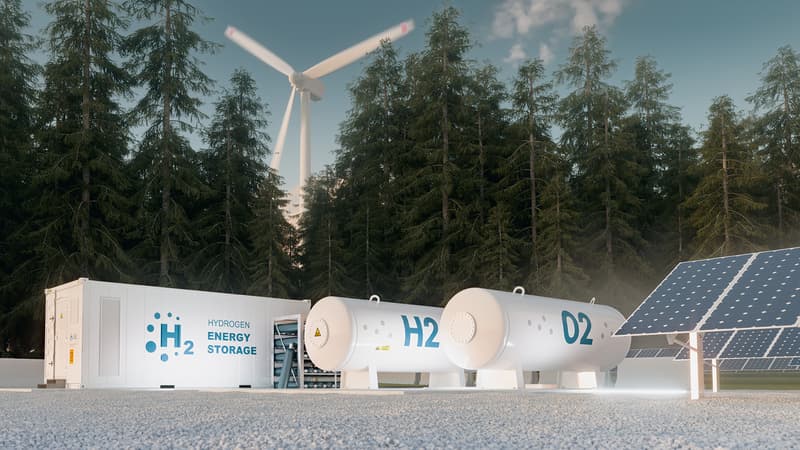
SICCOGEN: ENGINEERING, PROJECT MANAGEMENT, CONSTRUCTION MANAGEMENT AND TRAINING IN ENERGY ENGINEERING AND NEW ENERGY
The great bubbling. In large groups, SMEs or local authorities, projects aimed at decarbonizing our activities and producing from sustainable energies abound.
To accelerate the energy transition, strengthen their R&D or manage a project, many companies call on expert consultants such as Khadidiatou Camara, an engineer with a degree from Polytechnique Montpellier, via her SICCOGEN structure. To meet this growing demand, SICCOGEN has also set up a face-to-face and remote training program dedicated to professionals or individuals in professional retraining. This program will allow them to work, strengthen their expertise in this sector and promote the emergence of hydrogen projects in our territory. Meet.


For what type of mission are you called upon?
SICCOGEN is involved in all types of projects for the production, storage and distribution of carbon-free and sustainable energy. This ranges from the feasibility study, to the recommendation of the most suitable solutions for the industrial, logistical or other context of the company, to the assembly of the financing file, to the piloting of the project and its commissioning. It is therefore a global and technical expertise that is subcontracted by companies or local authorities.
We thus piloted the acceptance site of a hydrogen tank test center for electric vehicles for the automotive supplier Plastic Omnium in Brussels, piloted the construction of a biomass cogeneration plant for Calambio Engineering AB in Sweden, a ground-mounted solar power plant project of at least 2.5 MW for John Cockerill Energy or carried out feasibility studies for the deployment of hydrogen infrastructure for transport in France for the mayor of Auxerre, for the automotive supplier Faurecia and industrial companies such as Storengy. We also act as a hydrogen trainer at the ESIEE Paris engineering school. SICCOGEN has written technical sheets of practical methods for carrying out various energy transition projects on behalf of the Technical Engineering site and the ENSIATE¹ engineering school.
The sector is very dynamic. Research and development units are working to improve the performance of these new technologies to enable their use on a larger scale. There are many projects and challenges, whether dealing with storage issues via cheaper, more efficient and more durable batteries or improving production, storage and use of hydrogen. If R&D is essential to accelerate the energy transition of our territory, many projects are already emerging, carried by large groups or local authorities.
Another promising energy is biomass, which could be exploited using various processes (methanation, cogeneration, pyro gasification) to produce heat, electricity and green gas (hydrogen, methane) that can be used in the building sector ( heating, domestic hot water), transport (recharging), industry (industrial equipment supply or use in industrial processes), agriculture (fertilizers, agricultural equipment supply), is hampered by regulations that are not well adapted to the use of this technology on smaller units (restaurants, factories or households) and by a lack of financial support from the state.
On this particular point, SICCOGEN has participated in the design of a hydrogen production plant from biomass heat which is cheaper than the production of hydrogen from water and electricity. This project developed by a subsidiary of the CEA (Genvia) is very interesting because the hydrogen produced costs up to 3 times less and the heat sources are numerous such as nuclear, biomass or geothermal energy.
SICCOGEN operates in France and Europe but also in Africa with the preparation of a hydrogen exhibition in Côte d'Ivoire: what are the challenges?
SICCOGEN is involved in all types of projects for the production, storage and distribution of carbon-free and sustainable energy. This ranges from the feasibility study, to the recommendation of the most suitable solutions for the industrial, logistical or other context of the company, to the assembly of the financing file, to the piloting of the project and its commissioning. It is therefore a global and technical expertise that is subcontracted by companies or local authorities.
We thus piloted the acceptance site of a hydrogen tank test center for electric vehicles for the automotive supplier Plastic Omnium in Brussels, piloted the construction of a biomass cogeneration plant for Calambio Engineering AB in Sweden, a ground-mounted solar power plant project of at least 2.5 MW for John Cockerill Energy or carried out feasibility studies for the deployment of hydrogen infrastructure for transport in France for the mayor of Auxerre, for the automotive supplier Faurecia and industrial companies such as Storengy. We also act as a hydrogen trainer at the ESIEE Paris engineering school. SICCOGEN has written technical sheets of practical methods for carrying out various energy transition projects on behalf of the Technical Engineering site and the ENSIATE¹ engineering school.
The sector is very dynamic. Research and development units are working to improve the performance of these new technologies to enable their use on a larger scale. There are many projects and challenges, whether dealing with storage issues via cheaper, more efficient and more durable batteries or improving production, storage and use of hydrogen. If R&D is essential to accelerate the energy transition of our territory, many projects are already emerging, carried by large groups or local authorities.
Another promising energy is biomass, which could be exploited using various processes (methanation, cogeneration, pyro gasification) to produce heat, electricity and green gas (hydrogen, methane) that can be used in the building sector ( heating, domestic hot water), transport (recharging), industry (industrial equipment supply or use in industrial processes), agriculture (fertilizers, agricultural equipment supply), is hampered by regulations that are not well adapted to the use of this technology on smaller units (restaurants, factories or households) and by a lack of financial support from the state.
On this particular point, SICCOGEN has participated in the design of a hydrogen production plant from biomass heat which is cheaper than the production of hydrogen from water and electricity. This project developed by a subsidiary of the CEA (Genvia) is very interesting because the hydrogen produced costs up to 3 times less and the heat sources are numerous such as nuclear, biomass or geothermal energy.
SICCOGEN is also embarking on training open to all: why is it necessary on such a technical subject?
Effectivement, le génie climatique et les énergies nouvelles appliquées à la ville de demain, à l’industrie ou même à nos modes de consommation demandent des expertises pointues, une veille technologique permanente et une capacité d’analyse globale des exigences et opportunités de chaque projet.
Pourtant l’expérience montre non seulement un fort intérêt des entreprises et des particuliers pour des sujets comme l’hydrogène, mais aussi les freins importants mis à la réalisation de projets par la méconnaissance ou les préjugés portés à telle ou telle technologie. Enfin, c’est par la formation et la connaissance des potentialités de ces technologies que les projets seront initiés, validés et que s’accélèrera la transition énergétique.
Plus largement encore et parce que l’urgence de la transition écologique est réelle, chacun de nous doit se former aux problèmes climatiques et de biodiversité, sensibiliser ses concitoyens via des conférences, des interviews TV sur des plateformes nationales et internationales. C’est le moyen le plus efficace à disposition du plus grand nombre pour attirer l’attention et le soutien des politiciens réglementairement et financièrement. Et qui sait, de ces formations peuvent émerger les idées qui donneront les innovations dont le monde a besoin pour réussir sa transition écologique.
Nos formations se déroulent en présentiel dans nos nos espaces formations à Paris. Leur objet est de former des personnes techniques ou pas au développement de projet hydrogène dans nos locaux ou dans leurs structures d’origine. Il s’agit donc d’une approche technique et pragmatique.







